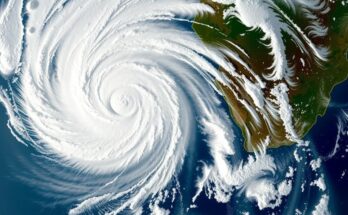Micha cárdenas’ exhibition, “Probability Engine: Atlantic Overturning,” debuting at Nuit Blanche in Toronto, confronts the imminent threats posed by climate change. Through innovative sculptures and an accompanying app featuring her poetry, cárdenas invites viewers to contemplate the societal implications of climate crisis and to act as catalysts for positive change. The exhibition stresses the urgency of understanding climate tipping points and the potential for collective action amidst rising global temperatures.
In her thought-provoking exhibition titled “Probability Engine: Atlantic Overturning,” micha cárdenas, an Associate Professor at the University of California, Santa Cruz, highlights the urgent threats posed by climate change. The exhibition, which opened on October 5 as part of Nuit Blanche in Toronto, emphasizes impending climate tipping points, such as the potential collapse of ocean currents and the melting of ice sheets, underscoring a stark reality: the earth’s temperature is dangerously close to the 1.5 degrees Celsius threshold that could trigger catastrophic events. Cárdenas, recalling the alarming findings from Tim Lenton, founding director of the Global Systems Institute, expressed her deep concern, labeling his report as “the scariest thing I have ever read,” indicating the pressing nature of the issue. By November 2023, global temperatures had already reached 1.44 degrees above the average. The exhibition showcases interactive sculptures and virtual reality installations, crafted to provide a visceral experience of climate justice. Curated by Syrus Ware, the work aims not only to inform but also to inspire visitors to envision a more equitable future. Among the central pieces is the “Atlantic Overturning,” a 15-foot sculpture representing the critical oceanic circulation system currently threatened by climate change. Cárdenas has collaborated with fellow artists to create additional sculptures addressing various aspects of climate crisis. These products serve as catalysts for contemplating potential futures amidst environmental degradation. The accompanying app features her poetry, which seeks to motivate individuals towards positive societal change. As cárdenas states, “I think the power of art resides in reaching people on an emotional and affective level. Scientists try to reach people on a logical level.” This sentiment encapsulates the exhibition’s goal: to elicit an emotional response in the audience, prompting engagement with the stark realities of climate change and collective resistance efforts.
The context surrounding micha cárdenas’ exhibition is rooted in the latest dire warnings regarding climate change, primarily articulated by researchers like Tim Lenton who have identified critical tipping points that could lead to irreversible damage to the Earth’s climate systems. Cárdenas, who combines artistry with critical social discourse, leverages her position to raise awareness of these issues through creative mediums. The looming threat of reaching 1.5 degrees Celsius of global warming has significant implications, as this threshold is associated with catastrophic ecological disruptions, including the collapse of major ocean currents and loss of vital habitats. Her interdisciplinary approach speaks to the broader role of the arts in societal transformation, seeking to evoke emotional responses that drive awareness and inspire action against climate change.
Cárdenas’ “Probability Engine: Atlantic Overturning” serves as both an artistic exploration and a crucial commentary on the existential threat posed by climate change. Through evocative sculptures, interactive installations, and poetry, she urges audiences to engage with the reality of climate disruption and consider their roles as agents of change. The exhibition not only raises awareness about the impending environmental crises but also emphasizes the transformative power of art in fostering collective responsibility and envisioning a sustainable future. It highlights the urgency of addressing the climate crisis with a sense of immediacy and individual agency.
Original Source: news.ucsc.edu




